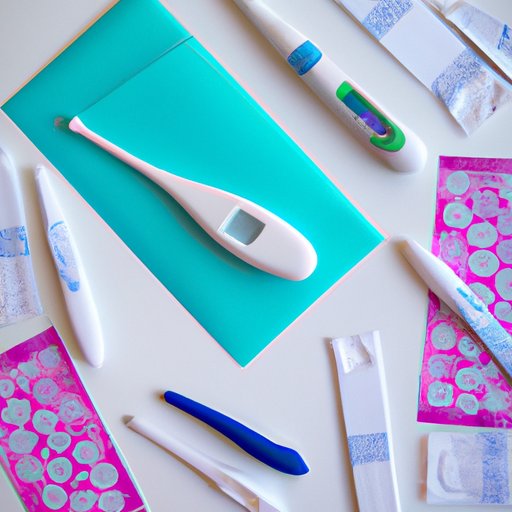Introduction
Fertility is the ability to conceive and reproduce. Menstruation is the monthly cycle in which the uterus sheds its lining in preparation for pregnancy. While these two processes are closely linked, it’s important to understand how they interact and the potential risks associated with trying to conceive while on your period.
Exploring the Relationship Between Fertility and Menstruation
Hormones play a key role in regulating a woman’s menstrual cycle and her fertility. During each cycle, the ovaries produce hormones that cause the lining of the uterus to thicken in anticipation of a potential pregnancy. If no pregnancy occurs, the uterus sheds its lining and the cycle begins again.
A normal menstrual cycle typically lasts between 24 and 38 days and involves four distinct phases: menstruation, follicular, ovulation, and luteal. During the follicular phase, the hormone estrogen is released, which causes the uterine lining to thicken. The ovulation phase is when an egg is released from the ovary. The luteal phase is when the hormone progesterone is released to prepare the uterus for implantation. Finally, during the menstrual phase, the thickened uterine lining is shed if no pregnancy has occurred.
Age, health, and lifestyle factors can all influence a woman’s fertility. As women age, their fertility decreases due to a decrease in the number of eggs available for fertilization. Poor health, such as being overweight or underweight, can also have an impact on fertility. Additionally, certain lifestyle choices, such as smoking and drinking alcohol, can reduce fertility.
What to Know About Getting Pregnant on Your Period
The odds of getting pregnant during your period are low, but not impossible. Sperm can survive in the uterus for up to five days, so it’s possible for sperm to still be present when ovulation occurs. That said, the chances of successful conception are much lower when having intercourse during your period compared to other times of the month.
Potential risks associated with trying to conceive while on your period include an increased risk of infection due to the presence of bacteria in the cervix. Additionally, some experts suggest that having intercourse during your period could increase the risk of miscarriage due to the presence of prostaglandins, which can trigger contractions in the uterus.

How to Determine When You Are Most Fertile During Your Cycle
In order to maximize your chances of conception, it’s important to determine when you are most fertile during your cycle. There are several methods for tracking your fertility, including tracking your basal body temperature, monitoring cervical mucus, and using ovulation prediction kits.
Basal body temperature (BBT) is the lowest temperature your body reaches during rest. By tracking your BBT over time, you can determine when you are most fertile. A rise in BBT indicates that ovulation has occurred and that you are likely to be most fertile.
Monitoring cervical mucus can also be helpful in determining when you are most fertile. Cervical mucus changes throughout the menstrual cycle, becoming thinner and more stretchy around the time of ovulation. This is a sign that your body is preparing for conception.
Finally, ovulation prediction kits measure the levels of luteinizing hormone (LH) in your urine. LH is released by the pituitary gland just before ovulation and is an indication that you are most fertile. These kits are relatively affordable and can be purchased at most drugstores.

The Pros and Cons of Trying to Conceive While on Your Period
There are both pros and cons to trying to conceive while on your period. On the plus side, having intercourse during your period may help to reduce the risk of miscarriage due to the presence of prostaglandins, which can trigger contractions in the uterus. Additionally, some experts believe that having intercourse during your period can actually improve the chances of conception due to the presence of higher levels of estrogen in the body.
On the downside, there is an increased risk of infection due to the presence of bacteria in the cervix. Additionally, the odds of successful conception are much lower when having intercourse during your period compared to other times of the month.

Understanding the Science Behind Fertility During Your Period
It’s important to understand the science behind fertility during your period in order to maximize your chances of conception. In order for conception to occur, the egg must be fertilized by sperm. Sperm can survive in the uterus for up to five days, meaning that it is possible for sperm to still be present when ovulation occurs.
Once the egg is fertilized, it travels down the fallopian tube to the uterus. Here, the fertilized egg implants itself into the uterine wall and begins to grow. This process is known as implantation and is necessary for successful conception.
Tips for Maximizing Your Chances of Conceiving During Your Cycle
In order to maximize your chances of conception, there are several steps you can take. Having intercourse every other day can help to ensure that sperm is present when ovulation occurs. Additionally, timing intercourse around ovulation can increase your chances of conception. Eating a healthy diet and taking supplements such as folic acid can also help to increase fertility.
Conclusion
Getting pregnant on your period is possible, but unlikely. It’s important to understand the science behind fertility and conception in order to maximize your chances of success. Tracking your basal body temperature, monitoring cervical mucus, and using ovulation prediction kits can help you determine when you are most fertile. Additionally, having intercourse every other day, timing intercourse around ovulation, eating a healthy diet, and taking supplements can all help to increase your chances of conceiving.
(Note: Is this article not meeting your expectations? Do you have knowledge or insights to share? Unlock new opportunities and expand your reach by joining our authors team. Click Registration to join us and share your expertise with our readers.)
